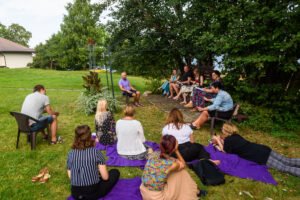Latvian NGOs call on the Prime Minister to ensure civic dialogue
On Wednesday, August 31, a meeting of the Latvian Council for Implementation of the Memorandum of Co-operation between Non-governmental Organisations and the Cabinet of Ministers (the Memorandum Council) took place. Prime Minister Krišjānis Kariņš also participated in order to discuss current issues in cooperation between non-governmental organisations (NGOs) and decision-makers, including in crisis management.
The NGO members of the Memorandum Council called on the Prime Minister to put civic dialogue into practice, to designate a responsible institution for civic society strengthening and development policy, and to ensure public participation and transparency in public funding issues.
During the conversation, Prime Minister Krišjānis Kariņš highlighted the importance of NGOs in the Covid-19 crisis and the Ukrainian war, stressing that NGOs were able to respond faster and more effectively than the public sector in these situations. K. Kariņš also called for considering the possibility to organise regular meetings of the Memorandum Council with the participation of sectoral ministers in order to maintain a regular dialogue with senior politicians on current issues and problems of civic society. K.Kariņš pointed out that he understood the issues raised in relation to the implementation of civic dialogue, and that solutions should continue to be sought in order to find a more appropriate model, including without making it too cumbersome.
Jānis Citskovskis, Director of the State Chancellery, pointed out that a discussion with stakeholders, including politicians, on what civic dialogue is and how to implement it is planned for early 2023. J.Citskovskis also presented the funding planned for the development of civic society in the state budget and programmes of the European Union funds, including the Recovery Fund, stressing that the funding of the European Social Fund+ measure “Support for the growth of civic society organisations by strengthening participation in decision-making processes of public administration” could be redirected to the Civic Alliance – Latvia to further strengthen the civic sector.
Summer camp “The role of NGOs in building resilient societies: security, capacity and growth” has concluded
The Civic Alliance – Latvia with the support of the US Embassy in Latvia organised a camp on the theme “The role of NGOs in building resilient societies: security, capacity and growth” from August 23 to 25. The aim of the camp was to strengthen the knowledge of Latvian NGO leaders working internationally and active in lobbying on the global security context, NGO capacity for change, as well as to promote personal development of the participants.
The first day of the camp focused on values, global security and international cooperation, while highlighting the role of non-governmental organisations. Krista Griķe, an expert in organisational culture and ethics, gave participants the opportunity to look deeper into their own values. Āris Ādlers, member of the Latvian Rural Forum Council, and Baiba Ziemele, Chairperson of the Latvian Alliance for Rare Diseases, shared their experience on how NGOs can engage in international activities to achieve local and international change, what resources it requires, and what opportunities it provides.
Experts from the Ministry of Foreign Affairs, the Ministry of the Interior and the Ministry of Defence briefed the participants on current developments in internal and external security, with a particular focus on the war in Ukraine and the situation in Belarus and Russia.
The second day of the camp was dedicated to communication and cooperation and mobilisation in crisis management. Inga Latkovska, a strategic consultant, spoke about how NGOs can better communicate and get their message across, and Linda Jākobsone, a board member of “I Want to Help Refugees”, shared lessons learned from recent crisis exercises. At the end of the day, the camp participants and the office of the Civic Alliance – Latvia took part in the #IndependenceInMyHeart #TheFreeWorldGathering march organised by the Latvian Ukrainian Congress to celebrate Ukraine’s independence and commemorate six months since the Russian invasion of Ukraine.
The third day of the camp was dedicated to the personal growth of the participants. On the third day of the camp, Aivars Dresmanis, an idealist, trainer and personal growth coach, visited the participants to discuss methods for work-life balance, while Sandra Landratova, a certified clinical and military psychologist, helped to strengthen the participants’ stress management skills.
During the camp, participants started work on a civic sector action plan to strengthen internal and external security.
CAL: The risks of poverty and social tensions must be taken into account when amending the Recovery Plan
The Civic Alliance – Latvia (CAL) calls on sectoral ministries and the Cabinet of Ministers, when deciding on amendments to the Latvian Recovery and Resilience Mechanism (RRM) Plan, to assess the impact of the current crises on different sectors and target groups and, when reviewing the content of the plan, to make meaningful changes, taking into account potential threats, including the risks of poverty and social tensions.
The CAL also calls for careful compliance with the horizontal requirements included in the Latvian RRM Plan approved by the Cabinet of Ministers and the European Commission: equal access to investment for all and socially responsible public procurement. Until now, the Cabinet of Ministers’ regulations drawn up by sectoral ministries have not complied with these requirements.
In order to better cope with the crisis caused by the Russian-instigated war in Ukraine, the CAL calls for environmental accessibility issues to be taken into account when drawing up plans for the renovation of any building. The current experience of working with Ukrainian war refugees in Latvia shows significant challenges in terms of access to various institutions and, even more so, in securing housing. Housing, including social housing, accessible to persons with functional disabilities is extremely limited and virtually unavailable for short or long-term accommodation or rental. There is also a need for a comprehensive programme to support rental apartments, where rental apartments would be equally available to Latvian residents and recipients of international protection in Latvia.


